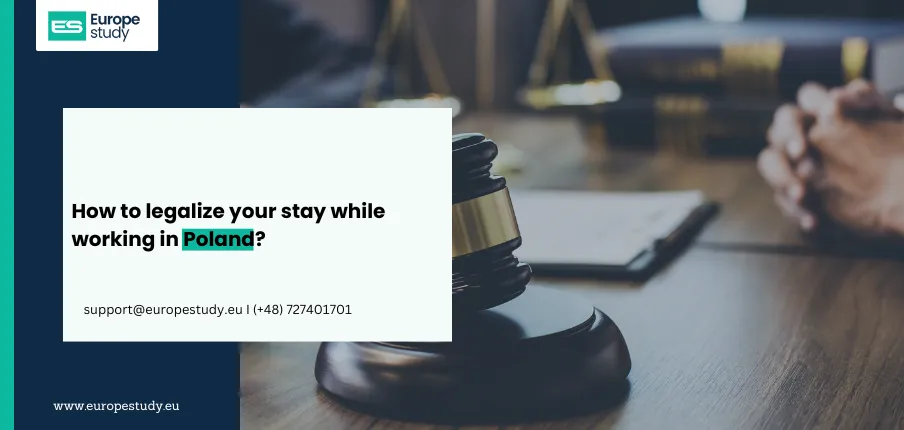
How to legalize your stay while working in Poland?
Working legally in Poland as a foreigner involves more than just securing a job. You must also ensure your stay in the country is fully legalized, which requires meeting immigration, labor, and residence permit requirements. Whether you're already employed or planning to relocate, understanding how to legalize your stay is essential to avoid legal issues and ensure long-term stability.
In this blog post, we’ll walk through the key steps to legalize your stay in Poland while working.
Who Needs to Legalize Their Stay?
Foreign nationals from non-EU/EEA countries are required to legalize their stay in Poland for employment purposes. Citizens of the EU/EEA and Switzerland do not need a visa or residence permit to live and work in Poland, but they must register their residence if staying longer than 90 days.
If you're from outside the EU/EEA, you’ll need to go through both the work authorization and residence permit process.
Step-by-Step Guide to Legalizing Your Stay in Poland
Step 1: Secure a Job and a Work Permit
Before anything else, you need a job offer from a Polish employer. Your employer will then apply for a work permit on your behalf. This work permit is usually linked to a specific job and company.
Types of work permits include:
- Type A: For standard employment by a Polish company (most common)
- Type B–E: For board members, delegated employees, or special cases
Note: If you're from certain countries (e.g. Ukraine, Belarus, Georgia, Armenia, Moldova), your employer may first use a declaration of intent to employ instead of a formal work permit for short-term jobs.
Step 2: Apply for a National D-Type Visa (If Applying from Abroad)
Once your work permit is approved, you must apply for a national visa (type D) at a Polish consulate in your home country. This visa allows you to enter and stay in Poland for more than 90 days.
Documents typically required:
- Valid passport
- Work permit or employer's statement
- Proof of accommodation
- Health insurance
- Visa application form
- Financial means documentation
The visa is usually granted for up to 1 year.
Step 3: Apply for a Temporary Residence Permit
Once you’re in Poland and employed, the next step is to apply for a Temporary Residence and Work Permit (zezwolenie na pobyt czasowy i pracę). This document not only allows you to live in Poland but also legally work under the terms of your job offer.
When to Apply:
Apply before your visa expires, ideally several months in advance. You can legally stay in Poland while your residence permit application is being processed.
Where to Apply:
At the Voivodeship Office (Urząd Wojewódzki) in the region where you are staying.
Required Documents:
- Completed application form
- Passport and visa
- Biometric photos
- Work permit or job offer
- Employment contract
- Proof of accommodation
- Proof of health insurance
- Confirmation of stable income
Processing time can take 3 to 6 months, sometimes longer depending on the office.
Step 4: Register Your Address
Once in Poland, you must register your residence address at your local city or municipal office (Urząd Miasta or Urząd Gminy). This is required for all residents staying longer than 30 days.
You will need:
- Rental agreement or housing proof
- Passport and visa/residence card
- Application form
This process is known as zameldowanie.
Step 5: Obtain a PESEL Number (if applicable)
A PESEL number is a personal identification number required for things like taxes, health insurance, and medical services. You can apply for a PESEL when registering your address or at a municipal office.
Not everyone is automatically issued one, but your employer or public office may require it for administrative purposes.
Step 6: Stay Compliant
Legalization is not a one-time task. You must:
- Renew your residence permit before it expires
- Notify the voivodeship office of changes in employment
- Avoid working in roles or companies not listed in your work permit
- Maintain valid health insurance
What Happens If You Don’t Legalize Your Stay?
Failing to legalize your stay can lead to:
- Fines
- Deportation
- Re-entry bans to Poland or Schengen countries
- Inability to renew visas or permits
It may also cause problems for your employer, who could face penalties for hiring undocumented workers.
Can You Bring Your Family?
Yes. After you legalize your own stay, you can apply for family reunification. Spouses and children may receive residence permits based on your legal status.
Final Thoughts
Legalizing your stay in Poland is a multi-step but manageable process if approached with care and preparation. The key is to:
- Start early
- Maintain clear documentation
- Stay informed on current immigration policies
While it may take time, once you’ve completed the process, you’ll have the peace of mind of living and working in Poland legally, with the potential to apply for long-term residence or even permanent residency in the future.





